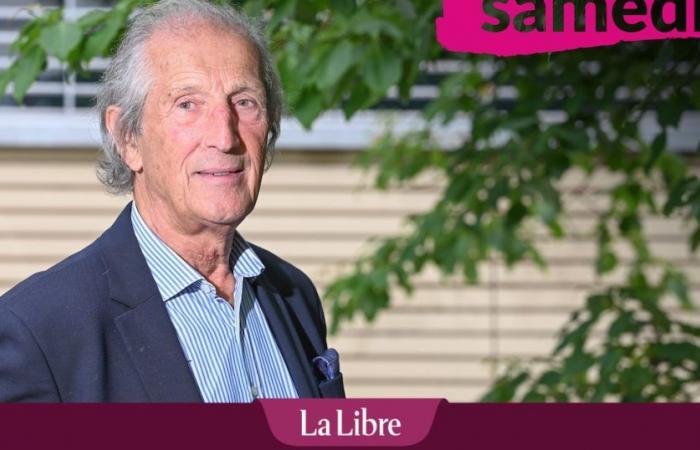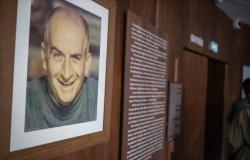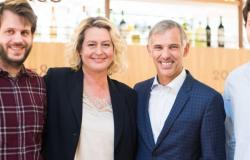
Michel de Robert is now 79 years old and is telling his story for the first time. That of a childhood “clocharde” more “free and happy” despite the abandonment. Interview.
Why was your instinct to hide?
Patrice has the reflex to take a sharp object, climb on a table and cut the rope. The man falls, there is this pool of blood. For a child, it is traumatic. He’ll think he did something terrible. Patrice catches me and we run off into the woods. Afterwards, he is filled with fear of what has just happened. He holds me back, explains to me that I must stay hidden. My brother is 18 months older than me, he is my reason for living, my role model. I only have him.
How are the first days in the woods going?
We spend the first night half-sleeping, then a day hanging out. There will quickly be the problem of hunger and thirst, but we will very quickly find something to eat. We start with what is accessible: blackberries that are a little too green, plants, leaves, a snail, a snake, wheat seeds in the fields… We discover, we taste, we try, we spit. We could have been poisoned, but we just have a stomach ache, or we vomit. It’s April, it’s not yet a time when it’s very cold. And there is no problem of bad weather right away.
How do you survive so young in the woods?
We’re not really wild children, because we don’t live in the virgin forest. We’re more like tramp kids. And we are going to become thieves, “chicken thieves”. It’s 1949: after the war, there are no markets, everyone has a chicken coop or a vegetable garden. We also go to the village dump, we go and steal from trash cans, from people’s homes. On the other hand, our nutrition is poor.
You have a powerful relationship with your brother. Is that what helped you keep going?
We survived thanks to two things. The love between us, which exists at the beginning, which will grow and become vital. And thanks to our complementarity and the admiration we had for each other. We are from two different fathers, we have two different characters and functionings. Patrice is agile, resourceful, fast, mischievous. I’m calmer, reserved and I use my brain. I’m making shelters, I’m going to understand how to find my way in the woods… And Patrice brought me everything I asked him to make a knife, something to make tiles, containers, etc. He protects me because he is the greatest. As he does things for me, I also want to do things for him. Our admiration and our complementarity will unwaveringly bond us together. I realize today how important it was.
Have you ever missed socializing with others?
No, we have filled the entire void between us. We had no one, we know that we didn’t exist for anyone.
No one tried to find out who you were? And no one wanted to find you?
Nobody was looking for us. No one walks in the woods if they have nothing to do there at the time. We met people, but two lousy kids scare you away. In a very small village, people quickly understood that we were thieves. They threw stones at us, they didn’t open the door for us. After the war, there were hundreds of children like us.
When your mother comes to pick you up, do you recognize her?
No. An elegant woman who arrives with a beautiful car intrigued Patrice, who therefore went to see her. When she tells us “I am your mother”, it doesn’t mean anything to us at all.
How is the return to society going?
Very bad. For us, it’s horror. We come out of freedom to be put in prison. We find ourselves in a family of tutors, we are bound hand and foot and bound, almost literally because they are afraid that we will leave. We spend 12 hours a day studying. We don’t have much vocabulary. They force us to read, write, calculate, study history, etc., so that we can enter school a year later. And that’s what’s happening. We go to school, but we don’t stay there because we are violent. This is where our mother separates us. I’m going to boarding school and Patrice is staying with her, but it’s been an unspeakable conflict. He explained to me that he fell in love with his mother. He developed an over-affection for her due to childhood trauma. My mother was with a 24 year old man – when she was 45 – and Patrice was 15-16 years old, so the two men were in conflict, they were fighting.
How to adapt to society after seven years in the woods?
The tutors are there to make us work. We are not resistant, we tell ourselves that we must learn to be like the others. Because the trauma comes from there, from the fact that we are different.
However, you have become an architect, Patrice, a doctor. You lead a bourgeois existence, radically different from your childhood. Were you looking for a certain luxury?
We never sought luxury, we just wanted to be like everyone else. Afterwards, it is the circumstances of life. I met someone who helped me financially to become an architect. Patrice had a girlfriend who was a nurse, which encouraged him to become a paramedic. He then entered the medical field. It’s nothing extraordinary.
Has your story left you with any trauma today?
I tried to understand how my mother could have acted in this way. I learned a lot about her when she was young, but also about my grandmother. But we keep this trauma all our lives. Today, even at my age, I have a hyper sensitivity to certain reactions. I like solitude, but I always have this feeling of abandonment.
Did you talk about it with your mother?
No. When I was 17, I asked her why she abandoned Patrice and me. She told me she never wanted us. Pff (he blows). It’s hard to hear, but it’s the truth. She got pregnant regularly, she had abortions 4 or 5 times. She said to me: “It was necessary, from time to time, that some would be born, but I didn’t want you”.
How did the relationship with your brother continue in your adult life?
The same relationship as a child. It’s an obligation to call each other every day, to talk to each other, to know what the other person is doing, what they’re doing. We always shared everything.
This story ended up killing Patrice, who committed suicide in 1993. Was it harder for him than for you?
He had more trauma than me. He felt responsible for taking me with him. It was complicated for him. And, at the same time, we had so much happiness as a child that he wanted to come back. He was bored, he told me that what he saw in society annoyed him.
How to survive without him?
It’s very hard. I got divorced. I stopped working for 7 or 8 months. I want to go with him. He told me he was leaving so I could live and this story would come out one day. I am in duality: do I join him or do I listen to him?
How can you create a family when you never experienced that in your childhood?
I don’t really have a typical life in that regard. I was married for the first time at 23, then I divorced when Patrice killed himself in 1993. I remarried 5 years later and lost my wife to cancer. Then I got married for the third time. Patrice was unable to have children, because of our nutritional deficiencies when we were young. I had one after 10 years, with my first wife. I have a great relationship with my son. Thanks to the film, he understood a lot of things about me, especially about our relationship with Patrice and me.
Why never talked about it before Patrice’s death?
I didn’t see the point in saying that. I don’t feel like it’s an extraordinary story, it’s just my life.
How did you come to tell your story for a film?
Olivier Casas (Editor’s note: the director of the film), who I had known for several years, one day saw me carving a piece of wood and he questioned me. I didn’t tell a story, I shared a story. Olivier immediately understood that these two children had been extremely happy, and that they were able to survive thanks to this extraordinary love that there was between them.





